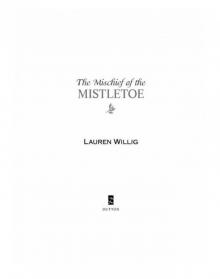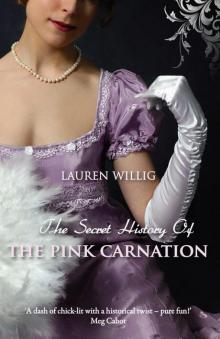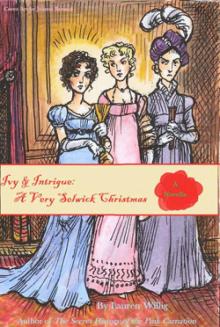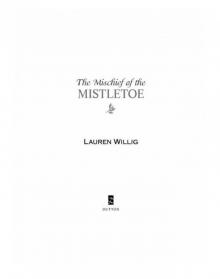- Home
- Lauren Willig
Ivy and Intrigue: A Very Selwick Christmas Page 3
Ivy and Intrigue: A Very Selwick Christmas Read online
Page 3
“Yes, but what does he keep in it?” said Lady Jerard in her soft voice, with a little smile to show that she was fooling.
“His own counsel,” flashed back Amy. It didn"t make much sense, but it was the first thing that came to mind. But, then, thought Amy mutinously, it was really Lady Jerard"s fault for punning on boxes in the first place. So there. With knobs on.
“Can one really keep counsel in a box?” Richard"s former best friend and current brother-in-law, Miles Dorrington, strolled over to join them. He kept well on the other side of the grouping from Richard, though. Matters between them had been strained since Miles had married Henrietta, in a manner that could at best be termed precipitate. “Deuced convenient, that. One could take it out when needed and bottle it away again when it became annoying.”
Henrietta snatched a chunk of gingerbread out of her husband"s fingers. “Like Pandora"s box, only without all the nasty bits,” she agreed. Taking a bite, she made a face and handed it back. “Too much orange peel.”
“But if it didn"t have any of the nasty bits,” Miles said, absently cramming the rest of the gingerbread into his mouth, “it wouldn"t be Pandora"s box. It would be a different box.”
“Why ever not?” countered Henrietta, cunningly waiting until Miles" mouth was full. “No one ever said Pandora couldn"t reuse the box for other things once she had emptied it. It makes perfect sense to me.”
It didn"t to Miles, but his mouth was gummed together with gingerbread. “Mrrrr-mrrr-mrrr-mrr,” he complained.
“Who,” demanded Mrs. Ramsby, “is Pandora?”
“I should think one might call her a first cousin of Eve,” said Lord Uppington mildly.
“Excessively curious ladies, both.”
Lady Uppington wrinkled her nose at him. “Come, come, Edward, don"t tell me you wouldn"t have eaten that apple.”
“Only if you had offered it to me, my dear,” replied Lord Uppington.
A loud groan emerged from Henrietta.
“They"re flirting again,” said Henrietta, in tragic tones.
She looked to her brother for support—it was his turn to express his horror—but Richard was a thousand miles away. Or maybe not miles, thought Amy, with a sinking feeling, but years away, back in the days when he was dashing around France with the sentimental memory of the fine eyes of one Miss Deirdre Ramsby to lend him inspiration.
That same former Miss Ramsby blinked her wide blue eyes at Amy. In a voice of innocent confusion, Lady Jerard asked, “How does your brother come to have a box at the Comedie Francaise?” She spoke the French words with decided discomfort. “Isn"t the Comedie Francaise in France?”
No, it’s in Hertfordshire. “Yes,” Amy replied, so demurely that Jane sent a sharp glance in her direction. “My brother resides in France. It would make little sense for him to have a box at a theatre in any other place.”
Mrs. Ramsby looked at her sharply. “Whatever does he do there?”
“Go to the theatre, one assumes,” provided Miles blithely. “Ouch!”
“That,” said Miss Gwen gravely, “was for being impertinent.”
“I thought it was very pertinent,” muttered Miles, but he made sure to stay well out of range of Miss Gwen"s fan as he said it. “I say, Hen, do you have any more gingerbread?”
Mrs. Ramsby was still attempting to conquer her natural revulsion at the notion of the foreign capital. The French were worse than sheep. Sheep…. French brothers…. Wherever had Lord Richard found that woman?
“Did you spend a great deal of time among the French, then, Lady Richard?” The title seemed to come hard to the older woman"s tongue.
Well, let it, thought Amy belligerently. Her daughter had had the opportunity to own it and had turned it down to marry her elderly baron, trading a mere courtesy title for a peerage as though the exchange of one man for another were nothing more than a move on a chess board, so many points to be won. Amy had never valued the worth of a man at his place in the peerage. She had seen for herself that it brought danger as well as privilege. Richard"s worth lay in himself.
Most of the time.
Amy snaked a glance at her oblivious husband. What was he thinking leaving her to the wolves like this? Not that she needed rescuing, of course. She could very well rescue herself.
But, still. Did he not want to take up cudgels against his former love? It was very hard to fight against the phantom of What Might Have Been.
“I was born in Paris,” Amy replied. “And spent my early youth there. My father was French.
I am half-French.”
From the expression on Mrs. Ramsby"s face, she clearly felt that that explained a great deal.
“You must find France sadly changed,” ventured Lady Jerard, in the tone of one determined to smooth oil over troubled waters, whether the waters wished to be oiled or not.
Why did the vile Deirdre have to be so… pleasant? It was very irritating. Amy took it as a personal offense.
“Change,” broke in Miss Gwen, in her precise, clipped accents, “is distinctly overrated. It is so seldom managed properly.”
“Change?” bellowed Uncle Bertrand. “What"s this about change? I don"t hold with it! In my day, we thought it sufficient to change our linen three times a year, and that was change enough for us.”
Across the room, Amy"s cousin Agnes, who had been glowing with the thrill of her first grown-up party, looked about ready to sink beneath the settee. Amy knew how she felt.
“But, Bertrand, dear,” piped up Aunt Prudence, in her vague, gentle voice, blinking her nearsighted eyes at him, “we"ve talked about that.”
Uncle Bertrand deflated, his chin sinking into the folds of his cravat. While much wrinkled, it had clearly been washed within the fortnight.
“Yes, I know,” he mumbled, before rousing himself sufficiently to add, with a hint of belligerence, “Not that I see aught wrong with a peck or two of good English dirt! If it"s good enough for England, it"s good enough for me!”
Lady Uppington"s lips twitched. “There"s something to be said for good English water, too,”
she said tactfully.
“Aye, in its place,” agreed Uncle Bertrand, determined to make himself agreeable to his hostess.
“Streams?” suggested Miles. “Rivers? Duck ponds? Eeep!”
His wife smiled sweetly at him. “You"ve been in that duck pond before. Don"t make me put you there again.”
Miles folded his arms across his chest. “I"ll have you know that I"m quite fond of ducks.”
“Yes, on a plate,” retorted his wife. “When they can"t peck back.”
Amy was used to their banter by now. Ignoring them, she looked to her own husband, who was rubbing his head as though he had the headache.
“Are you unwell?” Amy whispered.
Richard shook his head, like a swimmer breaking through the water. “I just need a breath of air. You"ll be all right?”
“Of course,” said Amy.
Ignoring the swirl of conversation around her, she watched as her husband gracefully extricated himself the grouping. Fending off his mother"s concerns about his health, he slipped out of the room, moving with all the speed of a man trying to outpace his own private pack of demons.
Amy just wished it didn"t feel quite so much as though he were running away from her.
Chapter Three
I saw three ships come sailing in,
On Christmas Day, on Christmas Day,
I saw three ships come sailing in,
On Christmas Day in the morning.
And what was in those ships all three?
-- “I Saw Three Ships”
The air was cooler in the hallway, away from the pressing heat of too many people, too many candles, and too much hot food all crammed into the same space. Funny, how even a room the size of a village green could feel crammed with enough people stuffed into it.
That wasn"t it, though, was it? It wasn"t the number of people or the smell of the food or the glare of the candles. It w
as the expression on Amy"s face when she had made that comment about being stranded in England. Richard couldn"t remember the exact phrasing of it, but the meaning had been clear enough.
It was maddening to know what she wanted and to be incapable of doing anything at all about it.
Only that wasn"t quite honest, was it? He could do something about it. That was the worst of it. In the back of his mind lurked the niggling possibility that if Amy really wanted to go back to France, it could be arranged. The only person who knew of her complicity in his escape was the Assistant to the Minister of Police, and he had since been retired to a private institution on the outskirts of Paris—for a rest, as the official report went. Absolutely barking barmy, was the way Richard"s source had put it. With Delaroche out of the way, Amy"s path would be clear.
Or it would have been, if she hadn"t married him. Marriage to the former Purple Gentian was a sure way to blight the career of a budding spy.
Even so, she might manage it. Her brother was well-liked in Bonaparte"s court, her cousin received without a qualm. There were few people in Paris who would recognize her. She could pose as a cousin, a maid, anything she liked, rather than staying in rural seclusion in Sussex, yoked to a useless former member of His Majesty"s secret service, with nothing better to do than tell over the tales of his aging exploits by the crackle of the winter fire.
Richard"s head thudded painfully.
It took him a moment to realize the noise wasn"t entirely coming from inside his own skull.
Heavy footfalls reverberated along the marble passageway behind him as a very large object propelled itself down the hallway with a vigor that made the statues shake in their niches.
“I say! Hold up a moment!” Richard"s one-time best friend came skidding to a halt beside Richard.
Not one-time. Long-time. He and Miles had been inseparable from Eton on, until Miles had had the temerity to marry Richard"s sister. Yet another upheaval in a year of upheavals.
It had been pointed out to Richard, forcibly and repeatedly, by the various females in his family, that the choice had not been entirely Miles". Henrietta had had a hand in it, too.
But it had still felt like a betrayal. A betrayal of whom, of what, and of why was not something that Richard felt like examining too closely. He had clung stubbornly to the mantra that Miles Should Have Known Better.
“Known better than whom?” his mother had said, with a pointed look at him.
That just made it worse. Just which one of them was her actual offspring? Miles might have been practically part of the family, but he was only so because Richard had brought him home, like a stray dog found begging at the kitchen door. He was supposed to be Richard"s dog—well, friend.
At the moment, he looked more like a kicked dog, gearing up to dodge another blow. As he trotted along beside, Richard could see Miles watching him warily, gearing up for yet another rebuff. He had been administering a lot of those recently, hadn"t he?
“Don"t look like that,” said Richard irritably. He hadn"t meant to say it irritably. It was just that everything seemed to come out that way these days. “I"m not going to bite.”
“A fine way you have of showing it,” Miles said, rolling his eyes in an exaggerated way, but there was too much truth in it for it to be entirely in fun.
It made Richard want to lower his head in his hands and groan. A fine mess he had made of things, hadn"t he? His wife unhappy, his best friend afraid of him…. Could he take the hands of the clock, turn them back, and do it all over again, starting somewhere back last Christmas?
“I"m sorry,” he said, instead, not meeting his old friend"s eyes as he pushed open the door to one of the smaller book rooms. There were three of them in Uppington Hall, in gradations of grandness. Richard had deliberately chosen the least grand, the one his father tended to use the most.
Richard went unerringly to the cabinet where the port was kept, drawing out a decanter and two glasses. He had been raiding the decanter in this particular study since he had turned twelve. Richard pulled out the stopper, filling each glass half full of ruby liquid, the finest product of Oporto. Funny, how some things stayed the same, while other things turned inside out and upside down.
Sometimes, Richard felt as though the world had chosen 1803 to turn on its head and spin like a top, with nothing to do but to cling to the sides and hope that it eventually would all turn right side up.
Shrugging, he handed Miles a glass. “It"s been a strange year.”
“At least it"s almost over!” Miles said cheerfully, seizing eagerly at the olive branch, pathetic and puny one though it was. He raised his glass in an impromptu toast. “Here"s to 1804!
Mmm, port,” he added happily, smacking his lips. “Nice port, too.”
Richard"s lips twisted, despite himself. He"d missed Miles. He didn"t like to admit it, but he had.
But all he said was, “Let"s hope a good wine makes a good year.”
Miles grinned as he plopped himself down in a Jacobean cane chair. “It can"t hurt.”
“Yes, it can,” said Richard dryly. “The next morning.”
Miles looked at him warily, as though suspecting a dangerous double meaning, but said, easily enough, “Time enough to think about that then.” He waved a hand airily through the air. “Sufficient unto the day, and all that—urgh!”
The hand, unfortunately, had been the one holding his glass.
“I hate to be the one to tell you this,” said Richard, nodding at the puddle of crimson liquid sinking nicely into the tan buckskin of Miles" breeches, “but port is meant to be ingested through the lips, not the leg. Just something you might want to know.”
“Oh, ha bloody ha.” Removing a handkerchief from his sleeve, Miles scrubbed at the stain, succeeding only in spreading it across a wider area. Richard couldn"t fail to notice that the handkerchief had been unevenly embroidered with Miles" initials. Or, rather, initial. The placement of the single, wobbly “M” suggested that it had initially been planned as part of a larger grouping.
“Henrietta embroider you handkerchiefs, did she?” said Richard, nodding at the scrap of cloth.
Stopping mid-scrub, Miles grinned fondly at the now reddened scrap. “Well, handkerchief, really. The others are still in progress.”
“Ah, yes,” said Richard cynically. “I still have the slipper Henrietta gave me for my birthday last year. When I asked her where the other one was, she told me it would be good for my health to hop.”
Miles beamed proudly. “She does like to get the last word. Jolly long ones, too, most of the time.”
Something about the glow on his old friend"s face suddenly made Richard feel very, very small.
He looked down into his own port, and saw only the wobbly reflection of his own face, darkened and distorted by the effect of light on liquid. If they were happy, who was he to object? Not that he hadn"t had cause, back in June, he told himself, when he had found his best friend and sister together in an extremely compromising position. But if Miles really loved her….
The force of Richard"s exhalation made ripples across the surface of the liquid, wrinkling his reflected face into a dozen identical folds.
“Look,” he said gruffly, by way of preamble.
Miles obediently looked. Henrietta had always said that Miles was excellent with direct commands. The recollection made Richard wince, but he continued doggedly on,
nonetheless. It was Christmas, devil take it, and he was bloody well going to be noble if it killed him.
It did occur to him that there might be something a little self-defeating about framing the sentiment in that way, but he dismissed that as beside the point.
Richard cleared his throat. It was the port, of course. Bloody viscous stuff, port. “Look,” he repeated. “Shall we let bygones be? New year, new leaf?”
Miles grinned at him, an all out grin that all but split his face in half. “I don"t see any bygones here, do you?”
Richard could. They were all around him, like evi
l sprites. Lost friends, lost opportunities, lost causes. “No,” he said. “Not a one.”
“Excellent.” Miles rubbed his hands together, flinging himself back across his chair with an unaffected exuberance that seriously taxed the capabilities of the two hundred year old frame.
“There"s something I"ve been wanting to run by you, something that came across my desk at the War Office….”
Stretching his legs out in front of him, Richard permitted himself a groan. The port must be mellowing him. “I miss the War Office.”
“They miss you, too,” said Miles sympathetically, before getting down to business. “Do you know a Captain Wright?”
“With an arr or a double-u?”
Miles did some quick mental spelling. No one watching him would ever have been able to guess that he had been top of their class at Eton for classical Greek.
Triumphantly shaking back the hair from his brow, Miles announced, “Both.”
“Has a boat, hasn"t he?” recalled Richard.
Miles was generous enough not to point out that the word “captain” generally implied the possession of some form of nautical conveyance.
It was beginning to come back. “Captain John Wright? He"s a naval man. He carried the odd packet back to England for me, when I couldn"t get hold of another means of convoy.”
Miles nodded. “He"s carrying more than correspondence these days. There"s a rumor than he"s been smuggling émigrés back into France.”
“What kind of émigrés?”
Miles flopped back in his chair. “That"s the devil of it. We don"t know. They might just be simple souls yearning for home and hearth. Or….”
That “or” carried a multitude of possibilities, most of them dangerous. All of Richard"s old instincts twanged discordantly. If Captain Wright was smuggling across French émigrés intent on fomenting revolution against the revolution, their amateur bumblings might do more harm to the royalist cause than—well, than any number of Bonaparte"s canons. The last thing they needed was another failed Royalist coup to give Bonaparte an excuse to tighten security and call public sympathy to his side.

 That Summer
That Summer The Mischief of the Mistletoe
The Mischief of the Mistletoe The Mark of the Midnight Manzanilla
The Mark of the Midnight Manzanilla The Other Daughter
The Other Daughter The Ashford Affair
The Ashford Affair The Lure of the Moonflower
The Lure of the Moonflower The Secret History of the Pink Carnation
The Secret History of the Pink Carnation The Masque of the Black Tulip
The Masque of the Black Tulip The Passion of the Purple Plumeria
The Passion of the Purple Plumeria The English Wife
The English Wife The Garden Intrigue
The Garden Intrigue Ivy and Intrigue: A Very Selwick Christmas
Ivy and Intrigue: A Very Selwick Christmas The Orchid Affair
The Orchid Affair The Summer Country
The Summer Country The Betrayal of the Blood Lily
The Betrayal of the Blood Lily The English Wife: A Novel
The English Wife: A Novel Masque of the Black Tulip pc-2
Masque of the Black Tulip pc-2 The Secret History of the Pink Carnation pc-1
The Secret History of the Pink Carnation pc-1 That Summer: A Novel
That Summer: A Novel The Mischief of the Mistletoe: A Pink Carnation Christmas
The Mischief of the Mistletoe: A Pink Carnation Christmas